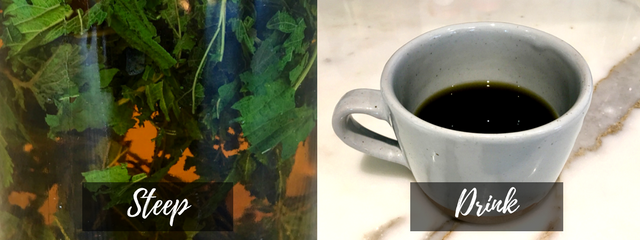
The Surprising Health Benefits of Stinging Nettle
May 11, 2017Even if you don't think you know what stinging nettle looks like-- chances are, you've met the plant before. It could have been when you were running around outside as a child and emerged with a painful, mysterious rash on your legs. Depending on where you live, you might even pass by a plant on your daily commute (even in NYC), where it grows "like a weed."
I was introduced to the medicinal properties of stinging nettle through renowned herbalist Amanda David of Rootwork Herbals in Ithaca, NY. She had me taste it first in tincture form— the flavor leaving a distinct seaweed imprint on my palate. Amanda told me this makes sense, considering both plants contain a very dense mineral makeup of calcium, magnesium, and silica— which, among other things, support skeletal and connective tissue health.
Last spring, when I was making a batch of nettle tea, I got into a conversation with a man from Ireland who was doing millwork in the apartment. "Nettle!" he exclaimed, "my mother used to make us drink nettle tea every spring to build our blood."
I've also heard from many that nettle is a wonderful plant that supports the body's ability to endure against hayfever and allergies. As a longtime sufferer of spring allergies, I can attest to the strengthening effect that this potent plant has had on my immunity during this most vulnerable time of year.
Medicinal Uses of Stinging Nettle
- Hay Fever
- Allergies
- Anemia
- Urinary tract issues
- Prostate issues
- Eczema
- Arthritis
Where to Buy
- Farmer's markets, such as Tweefontein Herb Farm regularly stationed in Union Square.
- Visit your local apothecary to buy nettle in bulk, or look for nettle tea or tincture in a health food store.
- More adventurous types can seek out an herbalist or forager who can show you how to properly identify and harvest the plant yourself.
How to Use
- Although nettle is generally considered safe when used as directed, you should exercise precaution when using with children and pregnant women. Read precautionary guidelines here.
- Fresh nettle can be incorporated into soups (use as you would kale or spinach-- be sure to cook for at least a few minutes to remove stinging qualities). Fresh and dried nettle is most commonly used in teas and infusions.
- To make an infusion, fill a large mason jar 1/3 full of dried or wet nettle leaves, and cover to the top with boiling water. Cover loosely, and let sit overnight. Strain in the morning, add some honey if needed, and enjoy this more potent dose of nettle medicine.

Sources: Amanda David of Rootwork Herbals, & University of Maryland Medical Center.



